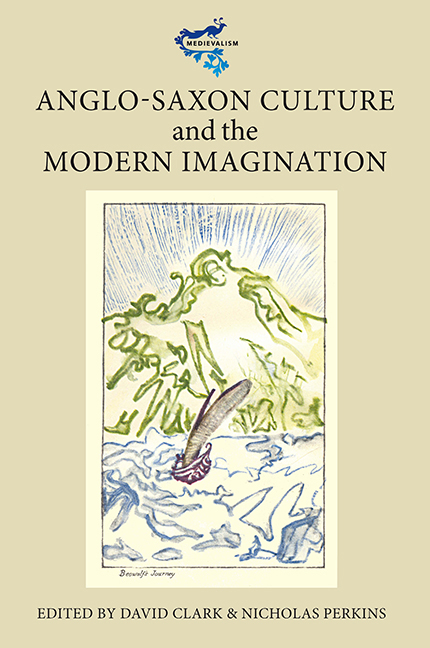Book contents
- Frontmatter
- Contents
- List of Illustrations
- Contributors
- Foreword
- Acknowledgements
- Abbreviations
- Introduction
- 1 From Heorot to Hollywood: Beowulf in its Third Millennium
- 2 Priming the Poets: The Making of Henry Sweet's Anglo-Saxon Reader
- 3 Owed to Both Sides: W.H. Auden's double debt to the literature of the North
- 4 Writing for an Anglo-Saxon Audience in the Twentieth Century: J.R.R. Tolkien's Old English Chronicles
- 5 ‘Wounded men and wounded trees’: David Jones and the Anglo-Saxon Culture Tangle
- 6 Basil Bunting, Briggflatts, Lindisfarne, and Anglo-Saxon Interlace
- 7 BOOO Seeing Beowulf in Pictures and Print
- 8 Window in the Wall: Looking for Grand Opera in John Gardner's Grendel
- 9 Re-placing Masculinity: The DC Comics Beowulf Series and its Context, 1975–6
- 10 P.D. James Reads Beowulf
- 11 Ban Welondes: Wayland Smith in Popular Culture
- 12 ‘Overlord of the M5’: The Superlative Structure of Sovereignty in Geoffrey Hill's Mercian Hymns
- 13 The Absent Anglo-Saxon Past in Ted Hughes's Elmet
- 14 Resurrecting Saxon Things: Peter Reading, ‘species decline’, and Old English Poetry
- Index
9 - Re-placing Masculinity: The DC Comics Beowulf Series and its Context, 1975–6
Published online by Cambridge University Press: 20 April 2017
- Frontmatter
- Contents
- List of Illustrations
- Contributors
- Foreword
- Acknowledgements
- Abbreviations
- Introduction
- 1 From Heorot to Hollywood: Beowulf in its Third Millennium
- 2 Priming the Poets: The Making of Henry Sweet's Anglo-Saxon Reader
- 3 Owed to Both Sides: W.H. Auden's double debt to the literature of the North
- 4 Writing for an Anglo-Saxon Audience in the Twentieth Century: J.R.R. Tolkien's Old English Chronicles
- 5 ‘Wounded men and wounded trees’: David Jones and the Anglo-Saxon Culture Tangle
- 6 Basil Bunting, Briggflatts, Lindisfarne, and Anglo-Saxon Interlace
- 7 BOOO Seeing Beowulf in Pictures and Print
- 8 Window in the Wall: Looking for Grand Opera in John Gardner's Grendel
- 9 Re-placing Masculinity: The DC Comics Beowulf Series and its Context, 1975–6
- 10 P.D. James Reads Beowulf
- 11 Ban Welondes: Wayland Smith in Popular Culture
- 12 ‘Overlord of the M5’: The Superlative Structure of Sovereignty in Geoffrey Hill's Mercian Hymns
- 13 The Absent Anglo-Saxon Past in Ted Hughes's Elmet
- 14 Resurrecting Saxon Things: Peter Reading, ‘species decline’, and Old English Poetry
- Index
Summary
TheBeowulf: Dragon Slayerseries, written by Michael Uslan with artwork by Ricardo Villamonte, was launched by DC Comics, New York in May 1975. Only six issues were ever published, with the final issue appearing in March 1976. The series is predictably free with its Old English source material, deliberately incorporating additional episodes and adventures which allow the narrative to be sustained as a continuing series and which blend the familiar myth of Beowulf the hero with other staples of the comic-book genre, such as dragons, demons — even Dracula, the Cretan Minotaur, and inter-planetary alien adversaries. Yet, alongside these creative divergences, there are also points of striking resonance with the Old English Beowulf, and the authors of the series discuss self-consciously their engagement with their medieval source and other literary influences. As a point of intersection between Anglo-Saxon culture and the modern imagination, the DC Beowulf series repays serious scholarly analysis. This essay represents an experiment in exploring how the Beowulf story is used in this one particular historical moment, and the ideological work which it might do for a set of audiences within the specific cultural context of 1970s America. In particular, my discussion will focus on representations of masculinity and male roles in the comics. Clearly, the context of the DC Beowulf series is one in which questions of gender roles and relations and masculinity are acutely prominent. The publication of the comics coincided with the US withdrawal from Vietnam and the return of many veterans — something which I will show to be strongly present in the comics’ paratextual material — as well as the rise of second-wave feminism and reactions to feminist movements within American society. In her highly influential book The Remasculinization of America: Gender and the Vietnam War, Susan Jeffords argues that
it is the crystallized formations of masculinity in warfare that enable gender relations in society to survive, offering territory in which to adjust, test, and reformulate general social relations.
I want to reflect upon these re-negotiations of gender relations in 1970s America through their traces in the ambivalent, divided masculinities presented by the DC Beowulf comics. But, as a medievalist, I am also interested in how a close analysis of the Beowulf comics — ephemera of late-twentieth-century popular culture — might illuminate the Old English poem Beowulf itself.
- Type
- Chapter
- Information
- Anglo-Saxon Culture and the Modern Imagination , pp. 165 - 182Publisher: Boydell & BrewerPrint publication year: 2010



